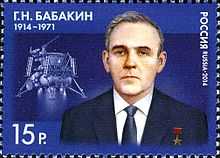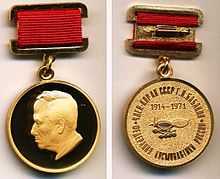Georgy Babakin



Georgy Nikolayevich Babakin (Russian: Гео́ргий Никола́евич Баба́кин; 13 November 1914 – 3 August 1971) was a Soviet engineer working in the space program. He was Chief Designer at the Lavochkin Design Bureau from 1965 until his death.
Babakin's early career was spent in radio engineering, starting with a job at the Moscow telephone company in 1930, working on an urban radio network. From 1943 to 1949, Babakin worked on radar targeting systems at the Institute of Automation (VSNITO), where he became its chief engineer.
Babakin became involved in the Soviet space program in 1949, working in Boris Chertok's division of NII-88 on surface-to-air missiles and targeting systems. In 1952, he was part of a group transferred to Lavochkin's bureau OBK-301 to work on the intercontinental cruise missile burya and the V-300 anti-aircraft missile.
In 1960, Lavochkin died at an aircraft show (literally died in Babakin's arms), and the bureau was subsumed by Vladimir Chelomei. It became independent again in 1965, with Babakin as its chief designer. Sergey Korolev wanted Babakin to take over unmanned lunar and planetary probes, so he could focus his attention on the N-1 Moon-landing project.
Babakin's new "NPO Lavochkin" brought improved engineering, testing and systems management to this problem, generating a series of successes where Korolev's bureau had been failing—the first soft landing on the Moon by Luna 9, the first probe of the Venusian atmosphere by Venera 4.
Babakin died shortly before the completion of the Mars 2 and Mars 3 spacecraft. His bureau continued with a series of impressive successes, the first (and only) Lunar rovers, landings on Venus and robotic sample return of moon rocks. A research division of NPO Lavochkin is named after Babakin, and the firm continues to design and build spacecraft.
The crater Babakin on the Moon and Babakin on Mars were named in his honor.
Literature
- A.I. Ostashev, Sergey Pavlovich Korolyov – The Genius of the 20th Century — 2010 M. of Public Educational Institution of Higher Professional Training MGUL ISBN 978-5-8135-0510-2.
- "S. P. Korolev. Encyclopedia of life and creativity" – edited by C. A. Lopota, RSC Energia. S. P. Korolev, 2014 ISBN 978-5-906674-04-3
External links
| Wikimedia Commons has media related to Georgi Babakin. |
- Babakin's Biography (Russian)
|